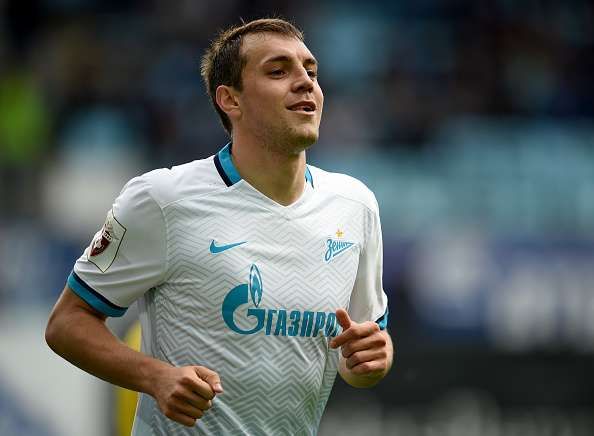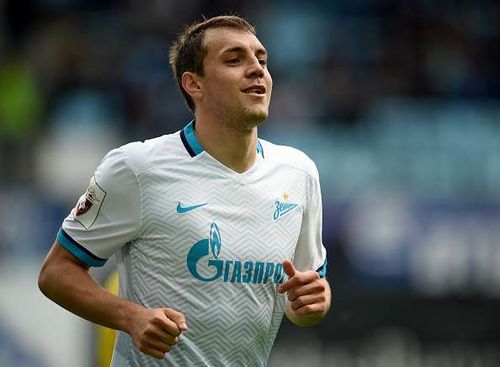
Euro Scout Report: Artem Dzyuba to spearhead dark horses Russia

As the curtain gradually closes on the domestic season, tournament trees are being pasted onto walls and sticker books are being sold left, right and centre ahead of the 2016 UEFA European Championship in France. Squads have slowly been unveiled and there are a number of relatively unknown talents looking to make an impact this summer, as they bid to render their nation the team to beat. Here is a look at Russia’s Artem Dzyuba.
Performance in Qualifying
Having kicked off their qualifying campaign in stellar fashion with a 4-0 thumping of Liechtenstein, Russia laid down a marker very early on. It would, however, take another three matches to pick up three points again and even on that occasion they came by virtue of Montenegro’s forfeit.
After a second 1-0 defeat to eventual group winners Austria, the Russians bounced back to win their remaining four qualifying matches under new coach Leonid Slutsky, which included a 7-0 demolition against the side they opened their campaign against. Amidst these fluctuating results, one man stood out; Artem Dzyuba provided the most potent attacking threat in a side renowned mainly for its solid defence.
The 27-year-old finished top scorer for his nation in the qualifiers, with eight goals and an assist to his name. Half of his goal tally came in the second slaughtering of Liechtenstein, while his goals in tight matches against Moldova and Sweden proved crucial in Russia’s eventual qualification.
Slutsky turned things around since taking charge last August, communicating with the players directly unlike previous manager Capello, while his faith to play Dzyuba as a lone striker paid off, instilling the Zenit forward with the confidence he needed to progress. Aleksandr Kerzhakov’s loss of form in front of goal coupled with Aleksandr Kokorin’s frequent injury blows left Russia light up top at times and without the prolific finishing of Dzyuba, who knows where they would have finished.
Playing Style
At 6’ 5”, Dzyuba’s aerial presence is unprecedented and a fair portion of his goals have been headers. While his imposing physique gives him the edge over most centre-backs in the game, it certainly doesn’t hinder any speed or agility either. Dzyuba has proven time and time again that he is quick on the turn, able to draw fouls in the box and win penalties and, although he may prefer to operate directly through the centre, he has the pace to play a wider role too. Ultimately, his clinical eye for goal and burning desire to make lung-bursting runs is what makes him such a talent.

With this playing style, however, there does arise a few limitations. Dzyuba’s hold-up play is poor and, despite his adoration for layoffs, don’t expect him to shield the ball from a host of opponents for long periods of time. Therefore, teams may look to force the forward to play with his back to goal to nullify his threat. He anchors himself to the top half of the pitch and like most out-and-out strikers, seldom tracks back.
Brief Club Background
Despite playing such a pivotal role for his country now, Artem Dzyuba only has 15 international caps to his name. Born in the nation’s capital, Dzyuba started his career at Spartak Moscow, for whom he racked up over 100 appearances and 26 goals. The Russian frontman remained on their books until last year but was loaned out season-after-season to FC Rostov and first Tom Tomsk. The switch to Rostov proved the most beneficial to his career, after he opened his account with a brace on his debut with them, before winning the Russian Cup a year later – his first major trophy.
Dzyuba opted to move to Zenit instead of continuing with Spartak after his loan deal with Rostov ended and his debut season was impressive, converting 15 league goals for Mircea Lucescu’s side.
What can we expect from him in Euro 2016?
So Artem prefers to get his goals from the air, meaning he’ll be keen to utilise the width and crosses of fellow forwards Aleksandr Samedov and Alan Dzagoev. Russia will be in Group B along with England, Wales and Slovakia, certainly not the toughest trio in the competition.
It is expected that Russia and Dzyuba will make an impression; the forward is brimming with confidence and will be pitted against teams lacking regular experience of top international competitions in Wales and Slovakia, while England’s side is comprised of young blood who are bound to have mistakes in them.
Having played his club career solely in Russia to date, Dzyuba may also be eager to use the competition as a platform to advertise himself to potential suitors across the continent, so expect his ordinarily ravenous appetite for goals to step up another gear. The side’s chances usually hinge on their work at the back, which is epitomised by the fact they conceded just five in qualifying.
Sergei Ignashevich and Vasili Berezutski are bound to tie down and frustrate opposing attacks, leaving them flustered and more susceptible to defensive frailties themselves. Dzyuba is clinical and will make no mistake of capitalising on such errors.

I wouldn’t run away with the idea that he’ll finish as the top scorer though, Russia lack the depth to progress much further than the last 16. That said, his tally could be boosted by the odd barnstorming performance which he has grown accustomed to.
England’s performances at major tournaments seldom emulate their electric qualifying form and so one can expect they’ll be a little shaky on day one, so Dzyuba may have balls flung into the box at him in the very early stages of the match.
Wales may offer Russia a more physical battle than England will, to compensate for a lack of finesse in the team, and that could unsettle Dzyuba ever-so-slightly, who isn’t the strongest at holding off opponents. In the knockout stages, courtesy of the new rule enabling the best four third-place sides to advance, Russia really could lock horns with anyone. If they were to draw France, Germany or Spain, Dzyuba could find it difficult to maintain the confidence he developed against mediocre sides during qualification.